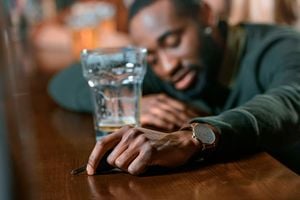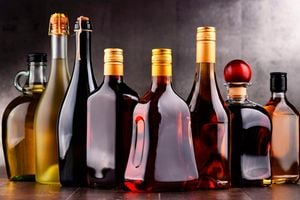
Investigations have revealed how unscrupulous liquor dealers in Mt Kenya region have been manipulating the ethanol content in alcoholic drinks.
A week-long investigation by Nation has exposed how unscrupulous liquor dealers in Mt Kenya region are manipulating the ethanol content in alcoholic drinks.
The investigation revealed that the ethanol content in the drinks was abnormally higher than what was stated on the labels. In addition, several of the beverages purchased had fake Kenya Revenue Authority (KRA) stamps affixed to them.
Against the backdrop of the recent deaths of 17 people after consuming contaminated alcohol in Kirinyaga County, Nation camped in Murang’a County to determine the ethanol and methanol content in several brands of alcohol sold in the region.
An analysis of six alcoholic drinks conducted by the University of Nairobi's Department of Chemistry revealed glaring discrepancies.
“What was indicated in the labels as the ethanol content by the manufacturers was different from what the drinks contained,” said Ms Alice Mutua, the head of the Chemistry Department.
The first sample had 15.68 per cent ethanol by volume compared to the label claim of 13 per cent, and the second had 15.68 per cent ethanol by volume compared to the label claim of 15 per cent.
The percentage of ethanol by volume of the third sample was 15.68 per cent compared to the label claim of six per cent, while the percentage of ethanol by volume of the fourth and fifth samples was 39.85 per cent each compared to the label claim of 40 per cent.
The sixth sample's ethanol by volume was 24.88 per cent compared to the 40 per cent on the label claim.
“We also found that some of the liquor bottles were also recycled and also lacked caps, making them unfit for human consumption,” Ms Mutua added.
To confirm our incontrovertible findings, the Nation team went on to purchase five other ranges of alcoholic beverages, which were sent to the Government Chemist in the Food and Drug Department for a comprehensive analysis of their contents.
The Government Chemist's Principal Laboratory Technologist, Ms Dorcas Muthsi, corroborated the earlier findings, saying the five samples sent to them for testing had ethanol contents abnormally higher than what was stated on their labels.
The results showed that the percentage of ethanol by volume of the first sample labelled ‘Ready to Drink’ was 6.11 per cent compared to the six per cent that was indicated on its label, while the percentage of ethanol by volume of the second sample was 14.75 per cent compared to 6.0 per cent as claimed in the label.
The third sample had 9.87 per cent compared to 15 per cent while the fourth had 8.47 per cent instead of 13 per cent on its label. The last sample had 12.73 per cent against 5.5 per cent on its label.
Two of the alcoholic beverages were repackaged in reused bottles of popular brands and resealed for distribution. All of the drinks were affixed with suspected counterfeit excise stamps.
Ms Muthsi said four samples had no manufacturing and expiry dates, while one sample had a bottle cap of another brand.
Further analysis was carried out on two samples purporting to be from the same brand. However, the results were different.
The label claim on both samples was six per cent ethanol, but after testing, each had different results. One sample had six per cent ethanol, while the other had 15.68 per cent.
Based on the results, Nation can authoritatively report that no methanol or other chemical contaminants were found in the samples of alcoholic beverages purchased in Murang’a County.
Unfortunately, these illicit products aren’t checked by the Kenya Bureau of Standards (Kebs) as they fall under second generation alcoholic drinks.
Kebs Quality Manager Liza Okoth told Nation that second and third generation brews are not recognised as alcoholic drinks that are made by mixing neutral spirit (food grade ethanol), water and flavourings.
She explained that such alcoholic beverages do not go through fermentation and/or distillation processes at the bottling plants, which violates Kebs standards.
She denounced counterfeiting as one of the biggest global headaches in the food, beverage and tobacco industries.
Similar sentiments were echoed by National Authority for the Campaign Against Alcohol and Drug Abuse (Nacada) Programmes, Research and Campaigns Director John Muteti, who noted that there is a lot of counterfeiting in the brewing industry in Kenya.
Despite frequent crackdowns on the sale of illicit alcohol and tough talk from the authorities, those involved in the trade have found new ways to conduct their business without arousing suspicion. Dealers often go underground until the dust settles and then resurface.
Prof Muteti praised the fight against counterfeit alcohol and illicit brew spearheaded by Deputy President Rigathi Gachagua.
“To succeed, the war against alcoholism in Central should be taken to the doorsteps of illegal brewers,” Prof Muteti said.
Mr Gachagua recently blamed the Judiciary and the police for the recurrent illicit brew-related deaths.
Speaking during the burial of 17 people who lost their lives last month after consuming poisonous illicit alcohol in Kandongu village in Kirinyaga County, he blamed the Judiciary for “issuing biased ex parte orders” that, he claimed, only favour illicit liquor vendors, making it difficult to completely stop such unscrupulous businessmen from thriving.
“We are wondering whether the courts want to help or worsen this situation by continuing to issue lopsided ex parte orders,” Mr Gachagua said.








